Redditors Support Woman Who Refuses To Have Her Husband Move In With Her Unless He Gets Rid Of His Dog
When a couple moves in together, the decision to get a pet is a significant one, but it can be especially difficult if one of the partners already has a pet. Getting a pet does not equate to having a child with your partner.
Any couple considering getting a pet together should ask themselves the following questions: Are we prepared for this level of responsibility? Do we have the extra funds to care for this pet?
This is exactly what happened to a Redditor, R/heatedcoilpq, and her husband, who has a dog he adores. They were evicted from their home and can't find an apartment that permits pets and is within their budget.
Clearly, the OP's husband hid the dog, and he's still making things difficult for the OP by refusing to give up the dog. Ridiculous, right?
However, the landlords of the affordable houses they find clearly state that pets are not permitted, yet the husband refuses to give up the dog, despite the fact that his children's safety and comfort are jeopardized. The Redditor was forced to bring this issue to the AITA community for feedback.
Scroll down to see how the entire story unfolded, culminating in the husband accusing his wife of being insensitive. The husband's attachment to the dog was about to tear the family apart.
The headline...

We ended up getting evicted

Our landlord has been super nice

Understanding Relationship Dynamics
Dr. Karen Lee, a family therapist, emphasizes that relationships often involve complex dynamics, particularly when pets are involved. The attachment individuals develop towards their pets can sometimes mirror familial attachments, leading to intense emotional responses when a partner suggests changes involving that pet.
Research in attachment theory suggests that these emotional bonds can influence decision-making processes, often resulting in conflict when one partner feels their emotional needs regarding the pet are not being respected.
Attachment Theory and Pet Ownership
The decision to refuse cohabitation unless a pet is removed speaks volumes about attachment dynamics in relationships. According to Dr. Helen Fisher, a biological anthropologist and expert on human relationships, "Pets often fulfill emotional needs that might otherwise go unmet in human relationships." Her insights can be found on her professional website, helenfisher.com. Research indicates that pets can serve as secure attachments, providing comfort and stability in times of distress. This suggests that the woman's refusal may stem from a perceived threat to her emotional stability and a desire to maintain her established support system. It’s crucial to recognize how deeply intertwined our relationships with pets can be.
I have to worry about my kids and their stability
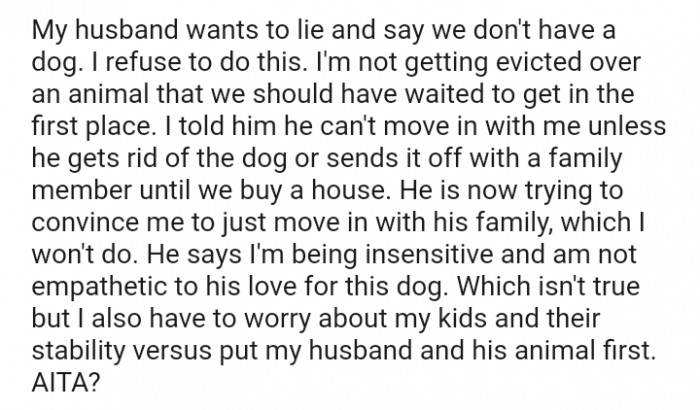
In just one day of being posted, the Reddit thread received 3.2K upvotes with over 500 comments. We've gathered some of the most upvoted comments from Redditors, so go ahead and check them out.
1. Your husband needs to understand

2. I would never risk my living situation
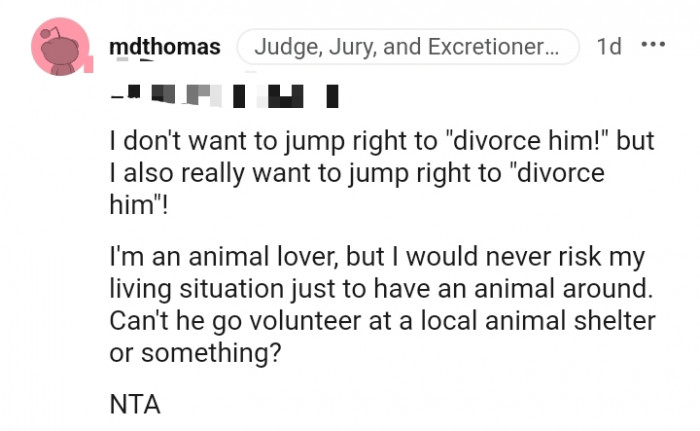
In situations where one partner refuses to compromise on pet ownership, it can lead to feelings of isolation and resentment in the other partner. Behavioral psychologists note that such scenarios often highlight deeper issues regarding control, autonomy, and respect within the relationship.
Understanding these dynamics can help couples address the root causes of their conflicts and work towards solutions that honor both partners’ feelings.
Experts in relationship dynamics note that conflicts over pets can often reveal deeper issues about compatibility and shared values. When one partner prioritizes a pet while the other views it as a burden, it can indicate misalignment in values around family and responsibility. Research indicates that these fundamental differences can lead to ongoing tensions if not addressed openly.
Therefore, having discussions about the role of pets in a shared living situation is essential for ensuring both partners feel heard and respected.
3. He can go to his family house by himself
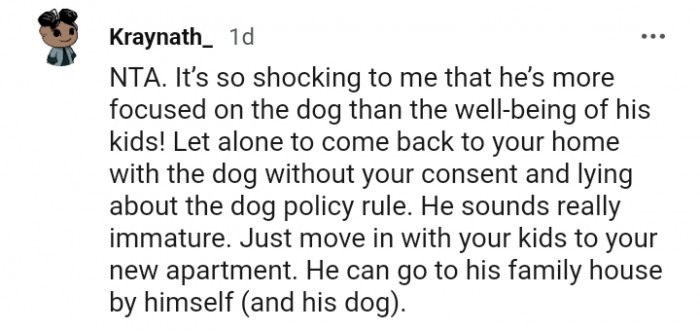
4. No better way to put it

5. She is my constant companion

The Importance of Compromise
Compromise is a cornerstone of any healthy relationship. Couples are encouraged to engage in open dialogues about their needs and boundaries concerning pets. Research shows that when partners actively negotiate compromises, it fosters a sense of teamwork and collaboration.
Establishing a shared understanding of the pet's role in their lives can help both partners feel heard and valued, ultimately enhancing relationship satisfaction.
Examining Co-Habitation Decisions
Decisions about living arrangements can have profound implications for relationships. Psychologists emphasize that creating a shared space requires alignment on various life aspects, including financial responsibilities, lifestyle choices, and emotional compatibility. Studies in family psychology highlight that the success of cohabitation often hinges on the couple's ability to negotiate and compromise on these elements.
In this case, the insistence on removing the dog may be seen as a non-negotiable stance, which could signal deeper issues about communication and collaboration within the relationship.
6. You won't lie to your landlord about it
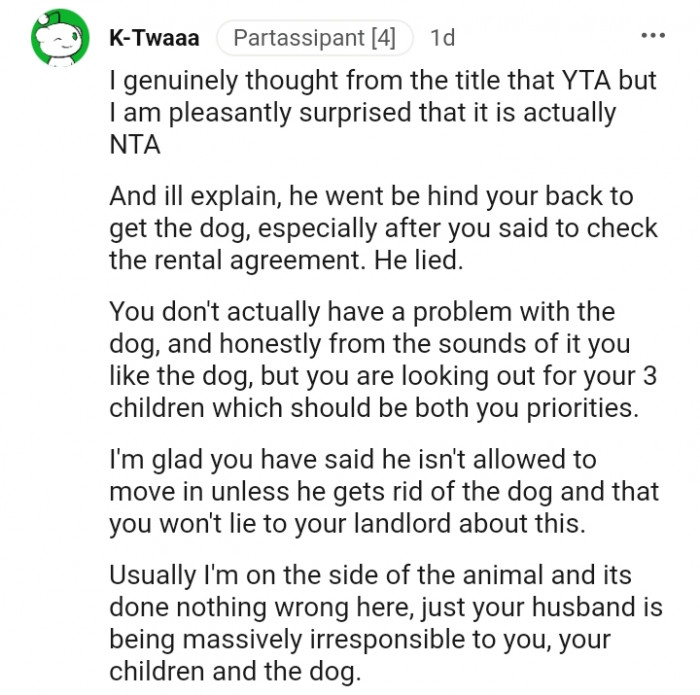
7. You are right to re-home the husband

8. You can't hide a dog for a long time

According to relationship expert Dr. Alexandra Solomon, "Successful negotiation in relationships hinges on empathy and the ability to listen actively." When partners invest time in understanding each other's viewpoints, they are more likely to discover a compromise that honors both individuals' emotional needs. This sentiment is echoed by Dr. Pepper Schwartz, who states, "The foundation of a healthy relationship is built on mutual respect and open communication." By fostering these skills, couples can navigate challenging situations more effectively.
To navigate such complex decisions, couples are encouraged to engage in constructive dialogues about their needs and boundaries. Establishing a framework for discussing sensitive topics—such as pet ownership—can help prevent misunderstandings. Research supports the idea that creating safe spaces for dialogue enhances relationship satisfaction and reduces conflict.
Setting specific times to discuss these topics can also foster a sense of partnership and cooperation, making both individuals feel valued in the decision-making process.
9. This is not a good situation for the dog

10. His behavior is pretty strange
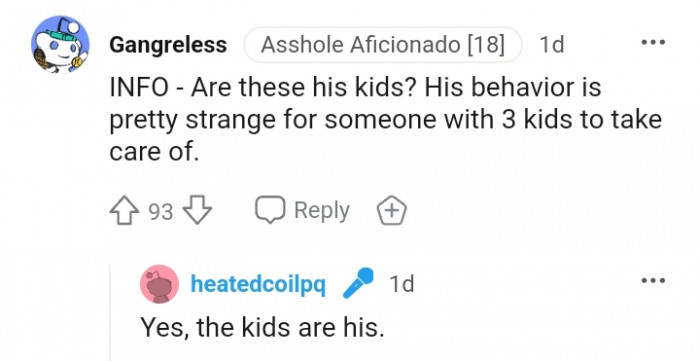
11. This took a way different direction than I expected

12. The OP has been likened to a single mother to four children
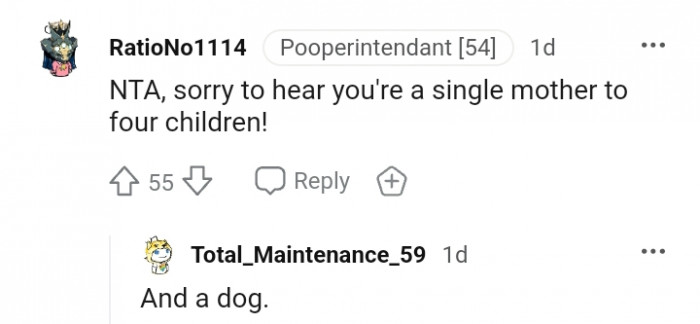
13. You move in and let me go

14. The OP thinks it's negligent to keep her

15. Husband has to choose between his dog and his family

16. Which is more important to them?

17. This situation is not fair to anyone

18. Whatever this Redditor said

19. There is no such thing as a free dog

20. You have to take care of your family

It’s really nice to have pets around because these animals will love and adore us without any reservations. However, there are situations where we clearly cannot afford to have them around.
It becomes even more serious if the comfort of our children and partners is involved. Let us know your thoughts about this issue in the comments section.
Psychological Analysis
This situation reflects a significant aspect of relationship dynamics where attachment to pets can influence major life decisions. It’s important for couples to communicate openly about their feelings and expectations regarding pets to ensure both partners’ needs are met. Navigating these discussions thoughtfully can prevent conflicts and foster a healthier living arrangement.
Analysis generated by AI
Analysis & Alternative Approaches
Understanding the interplay of attachment, values, and communication is crucial in navigating relationship dynamics involving pets. According to research in relationship and family psychology, addressing these topics openly can lead to healthier partnerships.
By fostering an environment of respect and collaboration, couples can work through challenges while ensuring both partners feel valued and understood.
Analysis & Alternative Approaches
Ultimately, addressing conflicts surrounding pets requires empathy, communication, and a willingness to compromise. As highlighted by various psychological theories, understanding the emotional connections involved can help partners navigate these challenges more effectively. Fostering a collaborative environment can lead to stronger relationships and mutual satisfaction.



